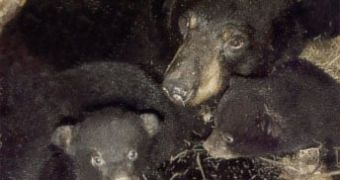Bears do not really hibernate. They can awake very quickly from their winter sleep and their temperature, heart beat and pulse do not drop significantly. Anyway, they pass the winter in an immobility stage and they go out of their dens in a very good shape.
In northern regions, like Canada or Siberia, bears can spend up to seven months inside their dens, a rest that would "liquefy" a human's muscles.
A new research shows that bears effectively emerge from their dens having the same muscle mass as before entering the den. The research could help astronauts and the bed-ridden patients preserve their muscle mass.
"Astronauts would come down from being in space, and they would complain of soreness in their muscles. They couldn't run as well. It would take a significant amount of time for them to get back into shape they would say." said Jonathan Van Dyke of the Medical College of Wisconsin in Milwaukee.
Van Dyke's team at the Medical College of Wisconsin analyzed samples of fat, muscle and blood from Wisconsin black bears before and during hibernation. The team chose the soleus muscle, an important calf muscle, necessary for both bears and humans when they are standing; this muscle atrophies significantly in humans when not exercised. The researchers investigated 10 bears during the active summer period and 12 bears while in their winter slumber.
The team, apart from finding the same muscle mass in both "hibernating" bears and summer bears, discovered that the two categories of bears presented the same amounts of slow-twitch and fast-twitch fibers, a great difference from people.
Human quick-burst muscles require no oxygen for burning glucose (to get energy), so "when you aren't using your muscles as much they tend to switch more toward a population that's fast as opposed to being slow," said Van Dyke.
Astronauts were found to have lost over 20 % of their muscle mass in the soleus after six months spent in the International Space Station. Beside muscle loss, astronauts also experience bone loss during spaceflight.
"Once you lay down or become 'unloaded' there's no activity or little activity in that [soleus] muscle," said co-researcher Janelle Romatowski, from Marquette University.
Van Dyke's team is now searching for chemicals in bears that impede muscles from shrinking.
"It offers many possibilities for therapeutic applications for patients who are chronically confined to bed, who may be comatose or who may be immobilized in a cast, and also for astronauts in microgravity." said Van Dyke.

 14 DAY TRIAL //
14 DAY TRIAL //